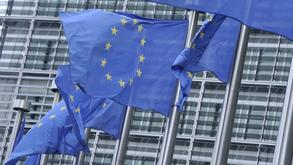 In this undated file photo, the European Union flags in front of EU headquarters in Brussels, Belgium. (PHOTO / XINHUA)
In this undated file photo, the European Union flags in front of EU headquarters in Brussels, Belgium. (PHOTO / XINHUA)
BRUSSELS - The European Union launched on Sunday the first phase of the world's first system to impose CO2 emissions tariffs on imported steel, cement and other goods.
The bloc will not begin collecting any CO2 emission charges at the border until 2026.
Importers will from 2026 need to purchase certificates to cover these CO2 emissions to put foreign producers on a level footing with EU industries that must buy permits from the EU carbon market when they pollute
Sunday, however, marks the start of an initial phase of the Carbon Border Adjustment Mechanism (CBAM) when EU importers will have to report the greenhouse gas emissions embedded during the production of imported volumes of iron and steel, aluminium, cement, electricity, fertilizers and hydrogen.
Importers will from 2026 need to purchase certificates to cover these CO2 emissions to put foreign producers on a level footing with EU industries that must buy permits from the EU carbon market when they pollute.
ALSO READ: EU carbon border tax plan 'violates WTO principles'
European Economy Commissioner Paolo Gentiloni said the aim was to encourage a worldwide shift to greener production and to prevent European manufacturers relocating to countries with lower environmental standards.
It is also meant to prevent them from losing out to foreign competitors while they invest to contribute to meeting EU targets to cut the bloc's net emissions by 55 percent by 2030 from 1990 levels.
Companies in the European Union, Britain and Ukraine have told Reuters they expect little initial impact during the trial phase.
The European Commission says the border levy is in line with World Trade Organization rules in that it treats foreign and domestic firms alike and allows deductions from the border fees for any carbon prices already paid abroad.
READ MORE: India: EU carbon tax may hit exports of metal and cement
"CBAM is not about trade protection. It is about protecting the EU's climate ambition – and seeking to raise the level of climate ambition worldwide," Gentiloni said in written responses to Reuters' questions.
European steel industry association Eurofer, which has been at the forefront of those in Europe seeking a border tariff, said the initial phase would test how watertight CBAM is at avoiding industrial production shifting abroad to countries with less ambitious climate policies.


